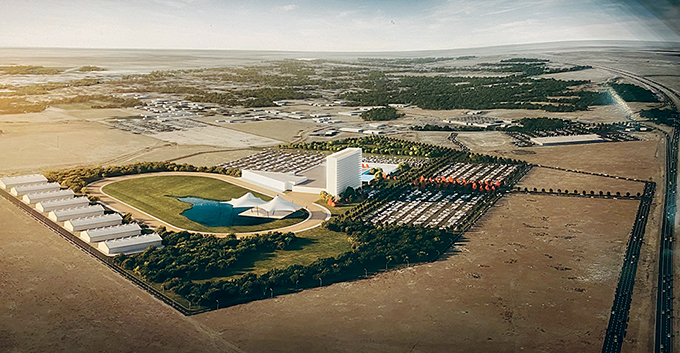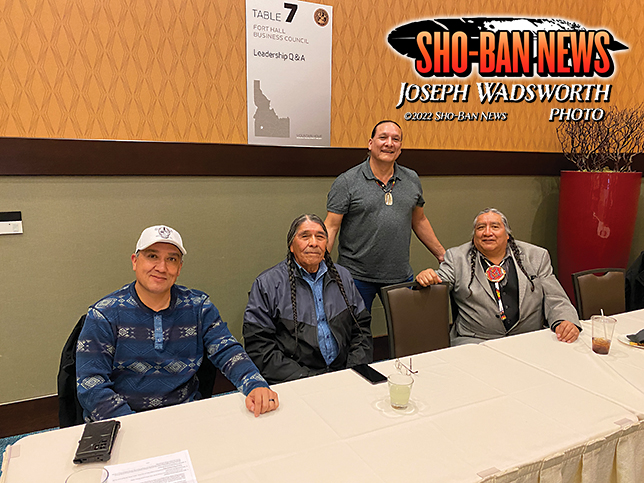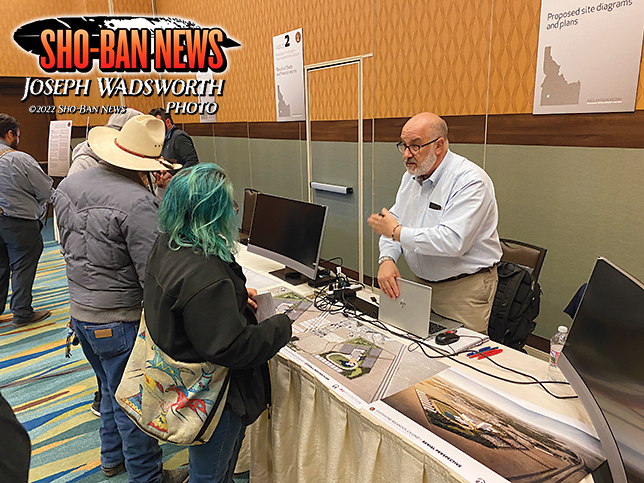Tribal members educated on Mountain Home economic venture

Mountain Home Project proposed plan diagram. (Submitted graphic)
By LORI ANN EDMO
Sho-Ban News
FORT HALL — The Fort Hall Business Council hosted a Mountain Home Economic Development Project open house May 9 and 10 where the plan for a new casino was explained.
Different stations were set up that began with a timeline, proposed plans, the Gaming Commission’s role, frequently asked questions (FAQ) and the plan to put the land into trust.
The proposed development summary includes: A casino with 2,000 electronic gaming machines; a 250 room hotel; six food and beverage venues; 15,000 square foot event center; 8-island bowling center; two movie theaters; a video arcade; horse racing track and a grandstand and an outdoor space. The proposed development size is 500,000 square feet and the proposed project budget is $311 million.
FHBC Chairman Devon Boyer said the open house is for education, “to educate our community, our public on what might be a plan, nothing is concrete everything is conceptual right now. We want to get pretty much a blessing on what might be a hotel, casino, horse racing track in the Mountain Home area.”
He said the council is looking at what the cost might be, what needs it to happen. He said everybody is coming up with their own conceptions saying it’s a secret, but it’s not. “We’re trying to educate the people, this is something that will make the Tribes money what won’t be normally for my children or my grandchildren, this would be in the matter of three to four years worst case scenario.” He said it will pay for itself in that amount of time that will be services for the future — something that is going to happen in our lifetime and that’s what we are here today to help people understand they can ask any questions they want, they can explore things that are available. And again it’s conceptual right now because we still haven’t had the blessing of the membership.

Fort Hall Business Council members (from left) Roland Marshall, Nathan Small, Chairman Devon
Boyer and Lee Juan Tyler at the open house.
He said the membership could vote on it at the Annual Meeting. If it gets blessed, the plan is to look at it more for what it may cost, getting things done for it. “You have to think ahead, have to think where are our employees going to live, how are they going to get medical versus here where it’s next door, where the education is going to be if in school, and you have to look at things that are a little bit longer down the road. We need to explore that, educate ourselves.”
A total of 157 acres was purchased in Elmore County in Mountain Home at the cost of $1.57 million from Tribal fuels tax revenue according to the frequently asked questions handout. Since 2020 the land value has reportedly increased 23%. The Tribes currently pay taxes on it and the cost this year was $5,874. The FAQ handout said the FHBC didn’t have to ask the tribal membership for approval to purchase the land under Article VI of the Tribes Constitution – it says the council has the authority to undertake and manage all economic affairs and enterprises, purchase land on and off the reservation.
The FAQ further explains jurisdiction, the gaming revenue distribution plan and when tribal members would receive per capita from the new gaming facility. Tribal members currently receive per capita from revenues generated from the three casinos on the reservation. The FHBC decided to first pay off the debt created from the new construction of the Mountain Home project and other related obligations to the facility. It may take a number of years before any additional per capita is provided.
The FAQ also addresses Fort Bridger Treaty rights if one worked at the new facility and whether that person would lose their rights. It reads Treaty rights are collective Tribal rights and the Tribes hold the ultimate authority to regulate the manner, guidelines and timing of harvest to protect that collective right for all members. For the purposes of hunting, fishing, gathering “residency” is often determined by a variety of factors including intent to return to the reservation, temporary versus permanent domicile at a worksite, absence from the reservation due to work and or education. It reads ultimately the decision of an individual member’s retention of rights under the 1975 Game Code and associated regulations is a fact-driven evaluation by the Fish and Game Commission. If the Fish and Game Commission determines that Tribal members who work at a gaming facility in Elmore County can exercise hunting and fishing rights off reservation, then that member can utilize the same privileges as provided by the Tribes associated laws, regulations and harvest guidelines. Currently, absent any extenuating circumstances and exception authorized by the Fish and Game Commission, a person who does not make the Reservation their permanent home is not eligible to exercise off-reservation hunting rights.

JCJ Architecture's Scott Celcella talks to tribal members.
A representative from Innovations was present — the company that did the financial feasibility study. It gave preliminary numbers on the profitability of the project. The information will be available on the Tribes website within the next week. Scott Celella with JCJ Architecture was also present to show renderings of the project based on the findings in the feasibility study.
Concerning the land into trust application, Jeanette Wolfley, tribal attorney, said it will take a while to complete maybe one and half to two years. They’re requesting for a meeting with Interior Secretary Deb Haaland once the application is completed to streamline the process. They just hired an environmental firm to do a study on the soil, cultural resources, endangered species etc. A second application is for off reservation gaming. She said Idaho Governor Brad Little supports the project and local legislators.
A survey was handed out for tribal members to complete so the FAQ can be updated and handed out at the Tribes Annual Meeting.





